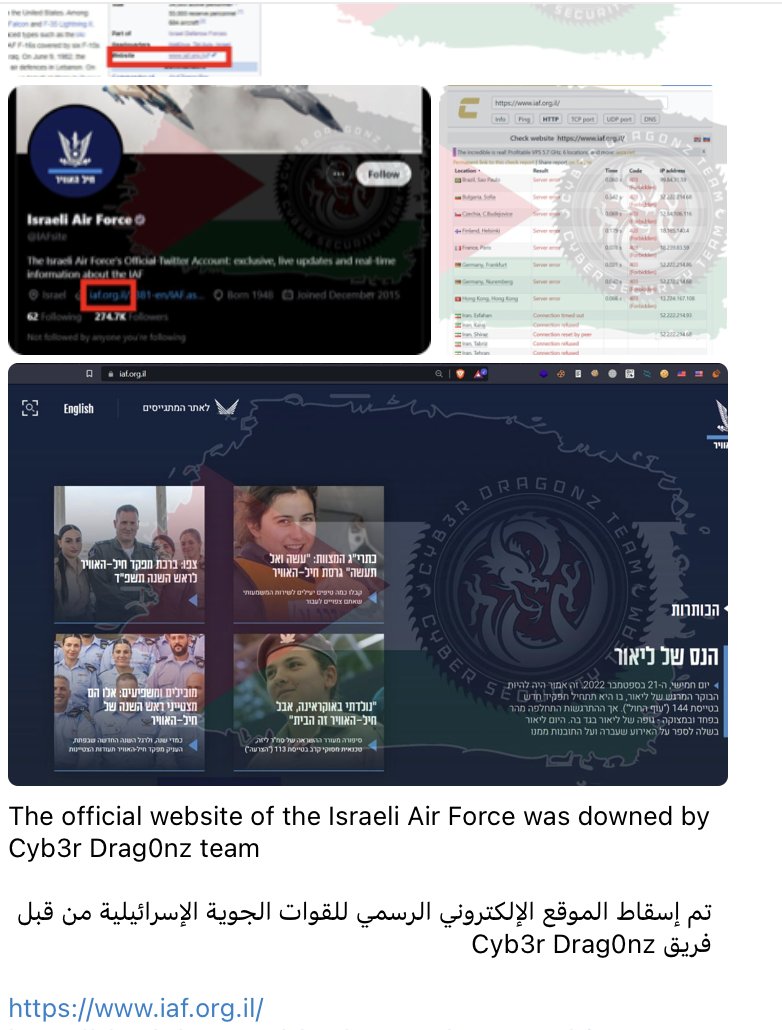In the ongoing Israeli-Palestinian conflict, a new battlefield has emerged between hacker groups. Israel’s critical infrastructure has been subject to relentless cyberattacks, prompting organizations to strengthen their digital defenses. In the most recent update, a notorious hacking group, Cyb3r Drag0nz, managed to target and take down the Israeli Air Force website.
Currently, attempting to access the website presents a 403 ERROR, indicating that although the server acknowledges the request, it is denying authorization. This is a common response when security measures have been increased following a cyberattack.
Additionally, a notification greets visitors explaining: “The Amazon CloudFront distribution is configured to block access from your country. » This suggests deliberate action to restrict access, potentially due to concerns about other cyber threats.
Palestine-Israel conflict: physical and digital war continues

In the middle of this Palestine-Israel conflictMany Israeli high-tech experts have temporarily turned their attention away from the private sector to help find missing people after the recent attack orchestrated by the Palestinian militant group, Hamas. This attack saw Hamas members breach heavily fortified Israeli security measures, infiltrating towns and kibbutzim, resulting in tragic casualties and numerous prisoners.
In response, Israel launched sustained airstrikes on Gaza, leading to Palestinian casualties, while simultaneously preparing for a ground offensive. A group led by Karine Nahon mobilized volunteers to analyze various forms of images, including videos posted online by Hamas. Their goal is to identify and locate more than 1,000 people still missing, providing crucial information to Israeli authorities.
However, the Israeli-Palestinian conflict does not end there as the war between the two nations has already taken on a digital dimension, with cyberattacks mainly coming from Russia-aligned groups. These groups are now turning to nations supporting Israel, anticipating demonstrations of solidarity with the nation.
Ideologically motivated independent hacker groups, particularly Russian-affiliated groups, have taken the initiative. They are believed to be targeting Australia And New Zealand with DDOS attacks, timed to coincide with anti-Israel protests. Sympathetic hackers aligned with Hamas are working to make the Israel-Gaza conflict the next battlefield in cyber war.
Palestine-Israel conflict: State-backed hackers jump into wildfire
Groups linked to countries including Iran and Russia have orchestrated a series of cyberattacks and online campaigns against Israel. Some of these events may have taken place before the Hamas attack on October 7. The scale and impact of these cyberattacks remain uncertain.
Previously, the war between Palestine and Israel was discussed in a report by threat intelligence service FalconFeeds. The Cyber Express reported the participation of more than 100 separate hacker groups, of which 20 lean toward Israel, 77 favor Palestine, and three remain neutral.
Those aligned with Palestine appear to have ties to countries like Iran and Russia, two key players in cyberattacks against Israel. Additionally, it is suspected that a small number of groups are based in Malaysia And Indonesia.
Israeli government websites were hit hardest by these cyberattacks, with one group managing to take down 20 sites in a single day. THE Jerusalem Post, an Israeli daily news channel, also suffered the crash of its website. It was later restored, but users continued to experience intermittent access issues.
Media Disclaimer: This report is based on internal and external research obtained through various means. The information provided is for reference purposes only and users take full responsibility for their reliance on it. The Cyber Express assumes no responsibility for the accuracy or consequences of the use of this information.


